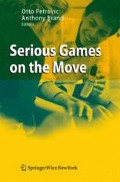Abstract
This paper presents an initial design of an assessment procedure within a personal junior doctor medical simulator (JDoc). It uses time-passed and trigger boxes to give the assessor the secondary information required to evaluate the user’s actions effectively. Our objective was to enhance our understanding of the different forms of game design assessment and how relevant secondary information can be obtained from within serious games. Primary information, answers to questions, alone do not provide the assessor with sufficient information to evaluate a user correctly. The paper outlines background information about JDoc and the assessment procedures within that are used to collect and report all the required secondary information. Incorporating secondary information within the assessment process gives serious games another advantage over traditional formative testing.
Preview
Unable to display preview. Download preview PDF.
References
Constantine LL (2003) Canonical Abstract Prototypes for Abstract Visual and Interaction Design. In: Jorge, JA, Jardim Nunes N, Falcao e Cunha J (eds) B DSV-IS. LNCS. vol. 2844, Springer, Heidelberg
Memmel T, Reiterer H, Holzinger A (2007) Agile Methods and Visual Specification in Software Development, A Chance to Ensure Universal Access. pp 454–461
Salvia J, Ysseldyke J (1998) Assessment. Houghton Mifflin Company, Boston, pp 432–450
Sliney A, Murphy D, O’Mullane J (2007) The Use of Personal Simulators as Medical Decision Support Systems Training Resources. EuroGraphics Ireland Workshop, UCD, pp 75–81
Sliney A, Murphy D (2008) JDoc: A Serious Game for Medical Learning. International Conference on Advances in Computer-Human Interaction, ACHI/IEEE, Martinique, pp. 131–136
Stephanidis C, Savidis A (2001) Universal Access in the Information Society Methods, Tools and Interaction Technologies. Universal Access in the Information Society 1(1), pp 40–55
Straughan R, Wrigley J (1980) Values and Education in Education. Harper and Row, London, pp 33–52
Wood R, Napthali WA (1975) Assessment in the Classroom: What Do Teachers Look for? Ed. Stud 1.3, pp 151–161
Author information
Authors and Affiliations
Editor information
Editors and Affiliations
Rights and permissions
Copyright information
© 2009 Springer-Verlag/Wien
About this chapter
Cite this chapter
Sliney, A., Murphy, D., O’Mullane, J. (2009). Secondary Assessment Data within Serious Games. In: Petrovic, O., Brand, A. (eds) Serious Games on the Move. Springer, Vienna. https://doi.org/10.1007/978-3-211-09418-1_15
Download citation
DOI: https://doi.org/10.1007/978-3-211-09418-1_15
Publisher Name: Springer, Vienna
Print ISBN: 978-3-211-09417-4
Online ISBN: 978-3-211-09418-1

